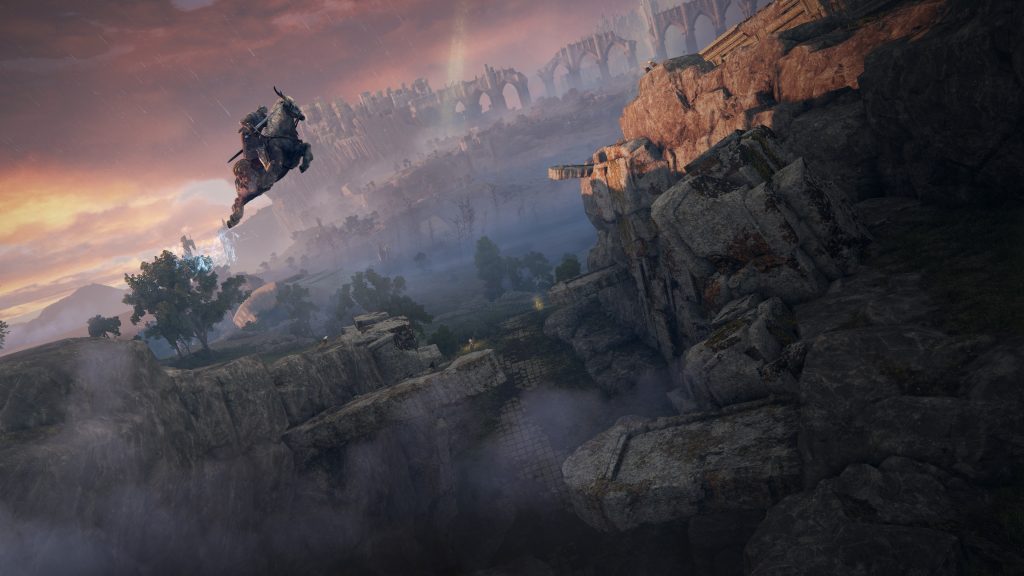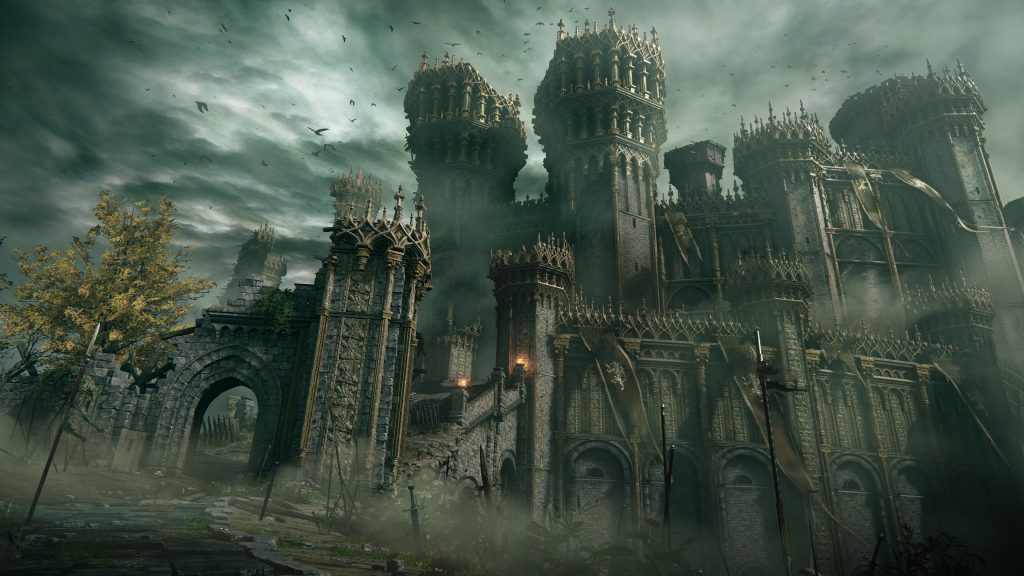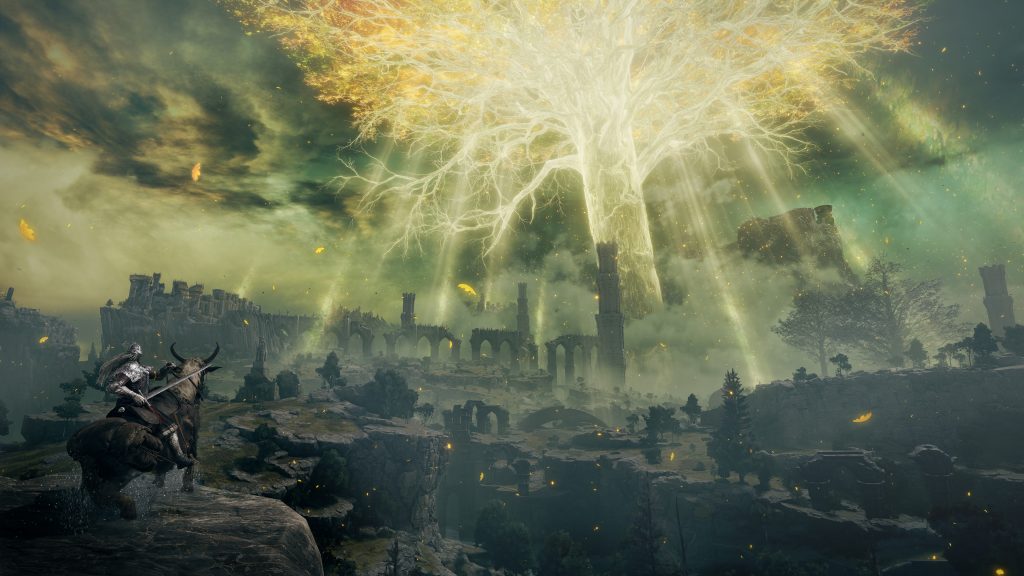Elden Ring is an action role-playing game developed by FromSoftware and published by Bandai Namco Entertainment. The game was directed by Hidetaka Miyazaki and made in collaboration with fantasy novelist and creator of the Song of Ice and Fire saga, George R. R. Martin, who provided material for the game’s setting. After a long wait from eager fans, the game was released in February of 2022 with raving reviews.
As someone with over 100 hours into the game (at least by the time I’m writing this) and a long-time fan of FromSoftware games, I’m officially hooked on exploring every inch of The Lands Between. You can only imagine how excited I was to learn more about the localization of the game, particularly the localization for Latin American Spanish – the language I’m using to play the game. Aside from Latin American Spanish and Brazilian Portuguese, Elden Ring has been localized into 14 different languages, including two variations of Chinese, Thai, Korean, and most European languages.
In this article, I am thrilled to have a conversation with Marina Ilari and Guido Bindi, who were part of the localization team led by GameScribes for Latin American Spanish for the game. Let’s dive into the interview!
Why were you excited to participate in this project?
Marina: I’m a fan of the genre so I was honored to take part in this project. What was particularly exciting to me about Elden Ring is the world design and the new open-world setting, which allows players to explore freely. But as excited as I was, I also felt a big sense of responsibility for bringing Latin American players the best possible experience when playing the localized version. I was aware of the huge fan base for the game and the high expectations surrounding its release, so the translation team wanted to give the absolute best for the gamers.
Guido: This is actually funny because at first when I started receiving the job requests for this game, I was unaware of the background of Elden Ring. To me, it was a remarkably interesting project, with very familiar and appealing lore and gameplay. Then I found out that it was the next creation of FromSoftware, and that Miyazaki and George Martin, no more and no less, were behind this project. I learned that it was the game that was revolutionizing everything and generating so much expectation. As an absolute fan of the A Song of Ice and Fire saga and the show, and fantasy literature in general, you can only imagine what it felt like to localize a game where George Martin was involved. I became really excited, thrilled by the chance of actually getting to know the core of this game, the story, the mechanics. Every time I got a new batch to work on, my enthusiasm only grew, and I felt completely drawn in by the story.
What was the main challenge for the translation of Elden Ring?

Guido: The translation wasn’t particularly challenging, or at least no more than other games. I mean, it was challenging in the way video game translation usually is because of the lack of context. For those of you who don’t know, our translation work consists of dealing with a program called a CAT tool, which assists us and makes our job less stressful. And we only see text. We usually don’t have access to the game, to check strings in context. So that was tough, maybe a little more so in this game, which is set in a purely fantastic world full of gods, spirits, creatures of all kinds, and magical powers. Therefore, some lines were very difficult to understand literally without seeing a description or picture. So, we turned to everything that was available to us: query sheets, pictures, videos, and glossaries. We would just use our best criteria and use all the information to create the best translation possible, which would reflect the essence of this dark, fantastic world.
Particularly for me, another challenge was unifying everything in terms of terminology, style, grammar, etc., since I worked mostly as a reviewer. We were a full team, and there were many translators, so it was a challenge to keep consistency throughout. But I believe we worked very well as a team. We used a dynamic sheet to create an internal glossary and a style guide, and that helped a lot. We could exchange comments there and work towards using the same terminology and style in-game.
Marina: Given the dynamics of the project, as translators, we were sometimes presented with strings without context, so it was important to always communicate with the project manager in charge of the project to gather as many reference images and descriptions as it was possible. For translators, context is everything because the meaning and intention of a text can change dramatically depending on context. Thankfully we had good lines of communication within the linguistic team and the project manager and we were provided a space to ask questions when needed so as not to provide a fault translation. An additional challenge we had was that the source text was being adjusted rapidly and we would receive new updated strings throughout the course of the project. We had to be very flexible and pay a lot of attention to detail throughout the whole project.
How did you manage the very specific terminology of the game?
Marina: Terminology management is absolutely essential in video game localization, especially when working on such a massive game. Terminology needs to be well-established and well-managed throughout the project, not only for consistency purposes but also to make sure we were following the very specific style and lore of the game.

We knew Elden Ring would be inspired by earlier games of the developer, such as Dark Souls or Bloodborne. There were some long-lasting items and references from previous games of the developer, such as Moonlight Great Sword the classical two-handed great- sword, Zweihander, and even the infamous character Patches, present in every FromSoftware game, so it was important to be aware of that. However, Elden Ring is a new IP and that meant we had to craft most terminology from scratch, which was very exciting but also very complex to do, given the genre.
Guido: To help us deal with terminology, we used the integrated termbase on the CAT tool and a dynamic sheet to keep consistency, as well as the game material provided by the client. The glossary in English was particularly helpful since it contained most terms used in the game, their explanations, other background information about characters, abilities, etc. We also checked terminology from previous FromSoftware’s games, mainly the Dark Souls saga. We considered it important to keep a resemblance in terms and lore with those previous games. Of course, when in spite of all the information available we couldn’t ascertain the meaning and context of a specific term, we would send a query to check with the client.
I would say that the most challenging aspect of this project was translating terms with a lack of context and the amount and degree of fantasy in the concepts.
How did you manage the localization of Old English?
Guido: To translate Old English, in Spanish we usually turn to something called “voseo reverencial”, as it is called by our most important institutions charged with regulating and safeguarding the use of our language.
This was one of the biggest challenges, I think, because in Latin America we are not usually exposed to texts written in Old English, and certainly, we don’t use this manner of speaking in our day-to-day conversations. It is confined to very few contexts, such as old literary texts or solemn ceremonies. More so, in LATAM we don’t use any kind of “voseo” in the same way as in Spain, so we had to continuously check the correct use of verb forms and tenses and get inspiration from other games translated from Old English.
To preserve the outdated tone of the wording and the manner of speaking of many characters, we also tried to use archaic vocabulary and structures, words that we don’t use normally in our daily lives. Not every character speaks using Old English, they are actually a few. So, we needed a way to manage that the other characters also sound contemporary to this ancient context.
This, aside from Old English, is what I think helped us to convey the outdated style overall.



Marina: Fortunately for Spanish we have several resources we can use when translating segments that contain Old English. There are terminology and even grammar choices you can make to try to convey the intention and the weight of the original source text. Perhaps one of the most challenging things about translating Old English is the risk of misinterpreting the intention of the text. It’s important to consult with the right sources so as not to confuse the original message, or even worse, confuse the players with a translation that is difficult to understand. I think it helps to be very familiar with the type of genre of the game. If you have read authors such as Tolkien who use this type of narrative in Spanish you will be much better prepared to work on it. Of course, it goes without saying that being familiar with George R. R. Martin literature was also be immensely helpful to the translation work of Elden Ring.
Localizing into neutral Latin American Spanish is always a massive challenge because it includes so many different countries and regions. Was it difficult to navigate the neutralness in this game?
Marina: I’m very passionate about this subject. I like to say that, different from Spain, Latin American Spanish translators might feel like they are sharing their parents’ attention with 20 siblings. It’s extremely difficult to be able to cater to so many different variants of the same language. The good thing is that Latin American audiences are used to consuming “neutral Spanish” through subtitles and dubbing of almost all audiovisual content. The tricky part is that, as translators, we are devoid of using regionalisms, slang, and cultural references that help spice up the language – they make it more fun and relatable. So Latin American Spanish translators are always walking the fine line between being neutral enough to be understood by everyone and being interesting enough so as not to provide a “washed up” version of the original. This particular game was not different in that sense, the translation team worked hard to walk that fine line. I would say that the more experienced you get with this type of work, the more ways you end up finding to make it work and it does feel amazing when you land that perfect phrase that feels natural and neutral at the same time. It’s those sorts of victories that make your work as a translator very rewarding.
Guido: Navigating neutrality is something that as LATAM translators and editors we are used to doing to cater to our vast and varied locale. It usually becomes more challenging when it comes to dialog lines between characters or with the player, since dialogs need to sound extremely natural, which is difficult to achieve when we are from different countries — each one with their own regionalisms and structures. Even more considering that they needed to sound archaic as well, and each of the characters has their own unique way of speaking.
So, this required investigation, checking with colleagues from other countries, and everything we usually do to make sure our translations are understood in all of Latin America.
With over 12 million copies sold worldwide within the first 20 days of the game’s release, how crucial do you think localization has been to a game of this magnitude?
Marina: I like to think the localization of Elden Ring has been crucial for the success of the game globally. It allows players from around the world to experience the game in their own language, which adds to the overall immersive experience. I’d like to take this moment to thank the localization team for all their amazing work, as well as give a shout-out to the Latin American team that worked with Guido and I: Mauricio Videla, Candela Blanco, Paula Morguen, Belén Ferreri, Luis Mondragón, Carolina Nass, and Raquel Seijo. I’m very proud of the work we did for this game, and it feels great to have contributed to bringing this game to the Latin American community!
Final thoughts
I’ve been a gamer for over 30 years now, and for me, this sub-genre that was created with Dark Souls and Bloodborne took the next step in its evolution with Elden Ring. Not only adding new elements to the souls-borne genre, like a rich open world and a much deeper and immersive storytelling experience, but also gameplay-wise, with hundreds of weapons, spells, and possibilities to experience the game. Elden Ring is truly a masterpiece that gamers worldwide deserve to enjoy in their native language. I couldn’t be happier to work alongside a team that participated in the localization of (in my opinion) this year’s GOTY.

Alexis Biro is from Buenos Aires, Argentina. He works as a Business Development Manager for Terra Localizations and also produces and co-hosts the videocast about video games and localization, Open World.
